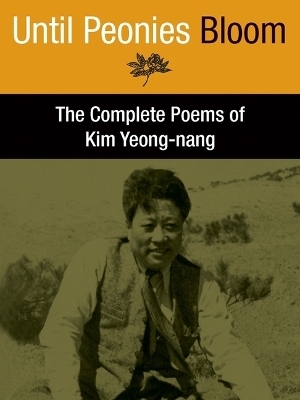
Until Peonies Bloom
The Complete Poems of Kim Yeong-nang
Seiten
2011
Merwinasia (Verlag)
978-1-937385-04-0 (ISBN)
Merwinasia (Verlag)
978-1-937385-04-0 (ISBN)
Kim Yeong-nang (1903-1950) is highly respected in Korea for the delicate lyricism of his poems. Yet in many ways he has remained little known, even in Korea, limited to a small number of often anthologized poems. Killed in bombing near the start of the Korean War, he had no time to participate in the development of a new Korean poetry.
Kim Yeong-nang (1903-1950) is highly reputed in Korea for the delicate lyricism of his poems. Yet in many ways he has remained little known, even in Korea, limited to a small number of often anthologized poems. Although he was a resolute opponent of Japanese colonial rule, he did not suffer frequent imprisonment, or death, so his role as a champion of Korean independence has largely been ignored. Killed in bombing near the start of the Korean War, he had no time to participate in the development of a new Korean poetry.
Many of Kim Yeong-nang’s earlier poems clearly express opposition to Japanese rule; after Liberation in 1945, he wrote to express his agony at the looming conflict between leftists and rightists that he saw threatening to tear Korea apart. At the same time, most of his poems are bold experiments in forms of Modernism; his use of images and symbols as well as his exploration of native Korean rhythms make him one of the most rewarding and challenging poets of his time. He spent most of his life in his native Gangjin, far removed from the literary world of Seoul, and the beauty of the Jeolla Province landscapes, as well as its dialect’s vocabulary, underlie his poetry.
Kim Yeong-nang (1903-1950) is highly reputed in Korea for the delicate lyricism of his poems. Yet in many ways he has remained little known, even in Korea, limited to a small number of often anthologized poems. Although he was a resolute opponent of Japanese colonial rule, he did not suffer frequent imprisonment, or death, so his role as a champion of Korean independence has largely been ignored. Killed in bombing near the start of the Korean War, he had no time to participate in the development of a new Korean poetry.
Many of Kim Yeong-nang’s earlier poems clearly express opposition to Japanese rule; after Liberation in 1945, he wrote to express his agony at the looming conflict between leftists and rightists that he saw threatening to tear Korea apart. At the same time, most of his poems are bold experiments in forms of Modernism; his use of images and symbols as well as his exploration of native Korean rhythms make him one of the most rewarding and challenging poets of his time. He spent most of his life in his native Gangjin, far removed from the literary world of Seoul, and the beauty of the Jeolla Province landscapes, as well as its dialect’s vocabulary, underlie his poetry.
| Erscheinungsdatum | 08.02.2017 |
|---|---|
| Übersetzer | Brother Anthony |
| Verlagsort | Portland |
| Sprache | englisch |
| Maße | 152 x 229 mm |
| Themenwelt | Literatur ► Lyrik / Dramatik ► Lyrik / Gedichte |
| Geisteswissenschaften ► Sprach- / Literaturwissenschaft ► Anglistik / Amerikanistik | |
| Geisteswissenschaften ► Sprach- / Literaturwissenschaft ► Literaturwissenschaft | |
| ISBN-10 | 1-937385-04-3 / 1937385043 |
| ISBN-13 | 978-1-937385-04-0 / 9781937385040 |
| Zustand | Neuware |
| Informationen gemäß Produktsicherheitsverordnung (GPSR) | |
| Haben Sie eine Frage zum Produkt? |
Mehr entdecken
aus dem Bereich
aus dem Bereich
Deutsche Gedichte aus zwölf Jahrhunderten
Buch | Hardcover (2023)
C.H.Beck (Verlag)
CHF 41,90
Eine Liebeserklärung an die Gebrauchslyrik
Buch | Hardcover (2024)
Piper (Verlag)
CHF 22,40


